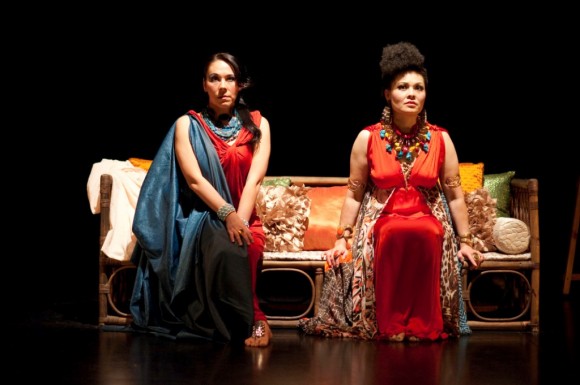THEATRE: History gets female perspective in Cleopatra’s Sister
Posted on November 3, 2011 By Mike Ross Front Slider, Theatre
 Trevor Schmidt’s new play Cleopatra’s Sister is a story about a conversation that might’ve taken place between two female historical figures – but no one actually knows because men wrote all the history books – played by two female actors, and where men play only an incidental role.
Trevor Schmidt’s new play Cleopatra’s Sister is a story about a conversation that might’ve taken place between two female historical figures – but no one actually knows because men wrote all the history books – played by two female actors, and where men play only an incidental role.
Schmidt’s last play, Heroine, is a play about a conversation that might’ve taken place between two female historical figures – but no one actually knows because men wrote all the history books – played by two female actors, and where men only play an incidental role.
We may be sensing a theme here. Well, they said it and they’re delivering it: This is Northern Light Theatre’s “Season of Women.”
Playing through Nov. 12 at the TransAlta Arts Barns (10330 84 Avenue), Cleopatra’s Sister stars Sylvia Wong as the Egyptian queen and Nadien Chu as her somewhat lesser known sister Arsinoe. The play begins as Julius Caesar has been assassinated and the poop has hit the fan at the old Ptolemaic Dynasty. In a confusion of political intrigue and high-powered sibling rivalry made even more vexing by brothers marring sisters and such, Cleopatra travels to Temple of Artemis in Ephesus (now Turkey) to have a little chat with her sister, whom she hasn’t seen in 60 years, to catch up on old times and to kill her.
As was the case with NLT’s Heroine, a yarn about two female pirates that takes place in their prison cell, the audience gets to be a fly on the wall as these two powerful women go at it.
“We’re use the term magical realism,” says Chu. “We’re being quite cavalier with what we think might’ve happened and taking some of the historical things that have happened and weaving that into a discussion. It’s not so much a history lesson. We’re trying to make it more alive.”
There was a BBC documentary in 2008 called Cleopatra: Portrait of a Killer that sheds some light on this little-known chapter in the famous queen’s life – little known because men wrote all the history books. There was apparently a skull discovered that may have belonged to Arsinoe, who was allegedly put to the sword on the steps of the temple at her sister’s order. Cleopatra, later on, did herself in by allowing herself to be be bitten by a deadly snake. All this we know. It’s what these people actually SAID at the time that is a source of fascination.
Both Chu and Wong say they relish the opportunity to play such meaty female roles. There aren’t many in theatre, or the movies, for that matter.
“In the canon of Shakespearian texts, there’s 570 parts for men and 52 or something for women,” Chu says. “Just because women weren’t allowed on stage at the time.”
And because men were behind most of the Big Events and therefore did the most damage and elicited most of the real-life drama, there aren’t a huge number of strong female figures in history, either. Cleopatra, of course, was a notable exception. She got all the press.
And where are the men in all this? Where is Antony? Where’s Octavian with his good line: You and what army?
Wong says, “We talk about men. I think they’ve shaped the lives of these two women.”
Chu adds, “But nobody’s heard the female side of it. It’s just another perspective.”
With underscoring from the Booming Tree Taiko Drummers – a form of Japanese drumming not known for its subtlety – and script, direction, set design and costumes all by playwright Trevor Schmidt, Cleopatra’s Sister runs until Nov. 12. Tickets can be bought online here.













